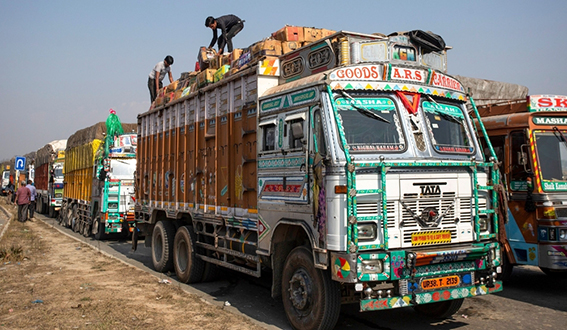.webp)
Danish Ali/Srinagar
For weeks, Kashmir’s apple growers have watched helplessly as their harvest rots inside stranded trucks. The frequent closure of the Jammu-Srinagar National Highway, the Valley’s only all-weather road link, has pushed the ₹10,000 crore fruit industry into a crisis.
September is the peak harvest season for Kashmir’s apples, a time when growers load trucks bound for Delhi, Mumbai, and beyond. But this year, landslides and flash floods left the highway shut for most of the past month, crippling the transport system. Trucks packed with perishable fruit were left stranded for days, some for weeks, while prices in outside markets collapsed.
Farmers on the Brink
Emotional scenes unfolded across fruit mandis in Sopore, Shopian, and Handwara as growers broke down. At Sopore mandi, Asia’s second-largest fruit market, farmers cried beside rotting boxes of apples. “We are ruined. Every hour of delay pushes us deeper into debt,” said Ghulam Rasool, a farmer from Shopian, his eyes welling up as he pointed to heaps of spoiled fruit.

Apple-laden truck on NH 44A
For thousands of families across South and North Kashmir, apples are the primary source of income. A single failed season means loans remain unpaid, children’s education is disrupted, and households sink into financial insecurity. “This is not just about business—it is our survival,” said Mohammad Ashraf, another grower from Kulgam.
Many small growers had borrowed heavily for pesticides, fertilizers, and packaging material, hoping for good returns. Instead, they are now staring at crippling losses. In Sopore alone, growers estimate losses worth hundreds of crores.
Anger Spills into Streets
The despair soon turned to anger. On Monday, apple growers and traders staged large protests in Sopore and Handwara, accusing the government of “criminal inaction.” Fruit mandis across the Valley observed a two-day shutdown in solidarity.
President Fayaz Ahmad Malik, popularly known as Kaka Ji, addressed protesters with sharp words. “If the Chief Minister cannot ensure safe passage for fruit trucks, he has no right to remain in office. Resign if you can’t do anything,” he thundered, warning of a Valley-wide strike if the situation did not improve within 48 hours.
A Video of farmers from Pulwama dumping their rotten produce was posted on X:
Kashmir supplies about 80% of India’s apples.
— Naveen Reddy (@navin_ankampali) September 17, 2025
⁰Heavy rains in Jammu & Kashmir have blocked the Srinagar-Jammu highway, preventing apple transport. With apples rotting in trucks and sales halted for days, farmers are dumping them on roads.
High chances apple price may increase… pic.twitter.com/uECB70a14B
In Kulgam, Apple Farmers’ Federation president Zahoor Ahmad urged the government to create alternate transport corridors. “Horticulture is the backbone of Kashmir’s economy. Any disruption impacts thousands of families,” he said.
Limited Relief, Lingering Wounds
Authorities briefly explored the Mughal Road as an alternative, but its narrow, treacherous terrain could not handle heavy trucks. The Indian Railways also introduced special parcel trains to ferry apples to Delhi, but they could only carry a fraction of the produce. “It was like pouring a bucket of water on a wildfire,” said Bashir Ahmad Basheer, chairman of the Kashmir Valley Fruit Growers and Dealers Union.
After nearly three weeks, the highway finally reopened for heavy vehicles on September 17, with traffic police prioritizing fruit-laden trucks. Yet for many, the relief came too late. “The damage is done. Who will compensate us for our rotting apples?” asked Mohammad Yousuf, a truck driver who spent 19 nights stranded near Ramban.
Kashmir’s apple growers are facing massive losses this year as floods and the prolonged closure of the Srinagar-Jammu highway disrupt the peak harvest season. The uncertainty is affecting both growers and truckers, putting the fruit trade in jeopardy. Bashir Ahmad Basheer,… pic.twitter.com/Llns1LHa11
— Awaz-The Voice (@AwazThevoice) September 17, 2025
A Season Lost
As trucks slowly make their way out of the Valley, the scars of this season will remain etched in orchards and households. For growers, the loss is not just financial but deeply personal—the erasure of a year’s labor and hope. With winter around the corner, many wonder how they will survive until the next harvest.
ALSO READ: Most unmarked graves in Kashmir are of unclaimed Pakistani jihadis
“The highway may be open now, but our future has closed,” said a farmer quietly, walking past crates of fruit already turning brown.
